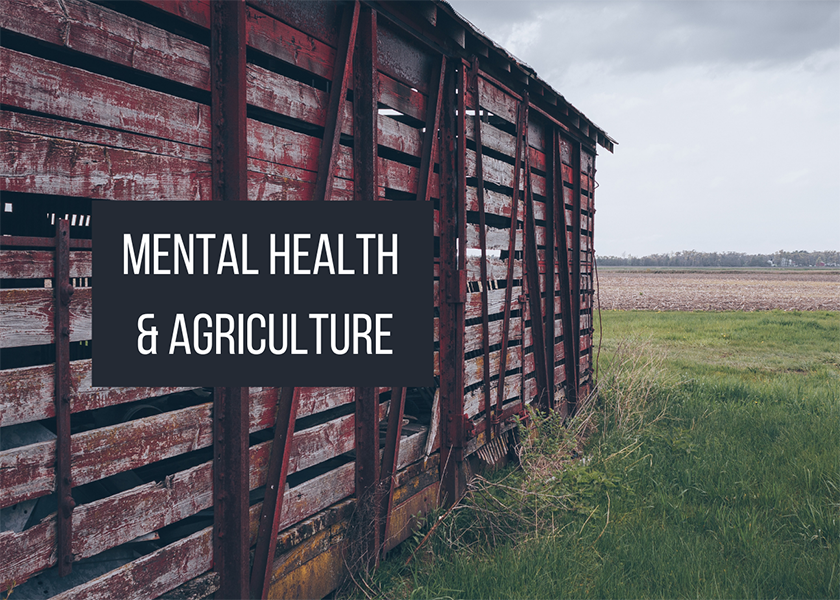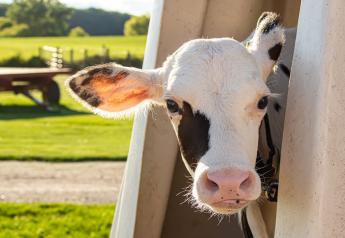It’s Time to Start Normalizing Mental Health Conversations on the Farm

Mental health hit center stage as the pandemic has wreaked havoc on the mental headspace of many. The Center of Disease Control (CDC) reports that one third of Americans experience symptoms of anxiety or depression. Furthermore, 85% of employees feel their wellbeing has declined since COVID-19. Farmers are among the most likely to die by suicide compared to other occupations, a statistic that was known before the pandemic even hit.
With a 24/7, 365-day commitment job, the stress is literally nonstop for dairy farmers. From rising labor challenges, high feed costs, shrinking margins, rising debt loads and COVID-19, the stress is all too real for dairy farmers.
Pennsylvania dairy farmer Jessica Peters understands all too well, as she has publicly shared her mental health struggles and advocates for mental health through her social platforms. She says, however, that her day-to-day life continued as usual during the first few weeks of COVID-19. “With the exception of not being able to buy toilet paper,” she remarks.
The first spark of fear for the fifth-generation dairy farmer came when dairy producers had to start dumping milk. “Even though my routine didn’t change during COVID, it was really hard watching the people around me be so heavily affected,” Peters states. “It all just changed so drastically and so quickly.”
While Peters family farm, Spruce Row, located in Meadville, did not have to dump milk, the heaviness and nonstop news of COVID-19 plagued her mental headspace. “Part of what helped was knowing that literally everyone was going through it with you,” she comments.
Peters says one of the many bright spots that came out of the pandemic is the spotlight it brought to mental health. "We were willing to talk about it because we were all feeling it. Which, in turn, made us all a little more willing to acknowledge it," she remarks.
Peters launched Secrets of Ag nearly two years ago to give others who were struggling with mental health a place to secretly talk about what they are feeling. She believes farmers are more willing to share their ‘secrets’ with her because they know she can relate. She adds, “I cannot promise that sharing or reading a secret will save a life, but I know how powerful it can be to just say things out loud.”
A Healthy Farm is Nothing Without a Healthy Farmer
Martha Trott, vice president of human resources in the Americas for DeLaval, says what is even more shocking than the statistics is the stigma surrounding mental illness, especially in the ‘rough and tumble’ dairy industry. “Farmers are hardworking and humble, but they may also be stressed and anxious,” she says.
While the sources of anxiety and stress might never go away, farmers can start talking about mental health by normalizing conversations about emotional wellbeing. “Sometimes, a conversation about wellbeing is enough to help, when other times an employee may be in crisis that requires professional help or more immediate assistance,” Trott adds.
DeLaval advises other companies to help their employees navigate mental health struggles with these tips:
- Make adjustments. Get a clear understanding of what an employee can do at work. Keep the conversation positive and supportive, exploring ways you can help. Consider adjustments to the person’s work schedule and/or responsibilities if they feel stressed or need time away.
- Offer encouragement. Be clear about your willingness to provide support. Let your employee know their work is valued and express confidence in their ability to address this challenge.
- Steer the employee toward help. Encourage your team member to seek advice from a health professional. If your business provides mental health resources, make sure your employee knows how to find and access them.
- In a crisis. If you believe someone is in serious risk of harm, take action. The National Suicide Prevention Lifeline is a hotline for individuals in crisis and for those helping someone in crisis. They’re available 24 hours/day and can be reached at (800) 273-8255.
More companies, like DeLaval, are offering employee assistance programs that include access to wellness therapy, workshops and material. DeLaval has expanded its support through their Wellbeing 360 program that provides managers with tools to have wellbeing conversations with employees and help them manage the stress that comes with the industry.
“It’s a long journey to break the stigma, normalize conversations and workplace supports for employees,” Trott says. “We may not be able to ensure the mental health of our employees, but we can make it our priority to try.”
Peters commends companies like DeLaval who are making mental health a priority in the workforce. “I think it’s been needed for years and I am glad that the pandemic brought a light to realize that farming community need to prioritize mental health,” she states. “I don’t care how we got here, but I’m glad that we are here – openly talking about mental health.”
For other dairy producers, like Peters, who struggle with mental health, she offers the following advice.
- Feel it. “You won’t be able to work through it if you don’t let yourself feel it.”
- Talk about it. “Whether it’s to your best friend, a family member, a professional therapist, your dog, or your camera - talk about it. I often video myself talking through my feelings. It’s like a video journal that helps me better understand how I’m feeling and why I’m feeling that way.”
- Get online. “This one can be tricky but has helped me immensely. Over the last year, I have found some accounts on social media that talk about mental health in a way that has helped me more than I ever imagined possible. The validation of reading a post or meme that spells out exactly how I feel is so freeing. It makes me feel less alone and more understood.”
- Get help if you need it. “As someone who has and still struggles with mental health, this one is tricky to recommend. There are so many online sources out there right now, another bright spot in this pandemic. A licensed therapist is literally a click away.”







